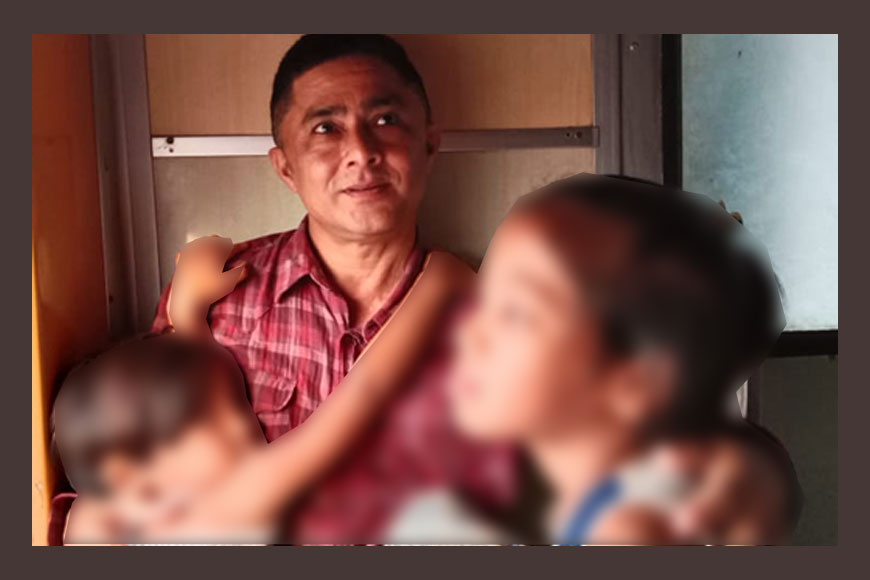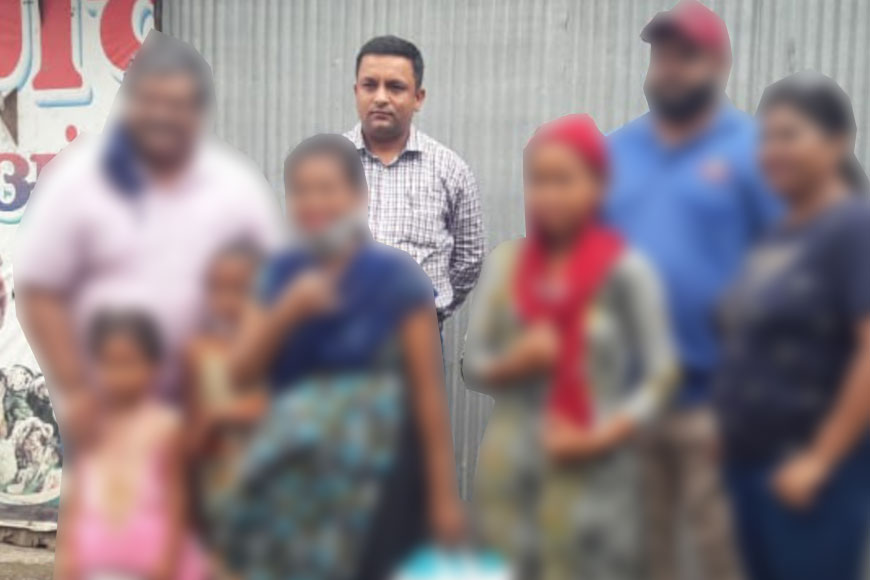Raju Nepali - the North-East Indian hero, working as a anti-human trafficking activist

It is said that God blessed us with His angels, so they guard and protect us, inspire and help us. The poor families living in different districts of North Bengal find such an angel, a messiah in Raju Nepali, an anti-human trafficking activist and a local hero in the entire North-East India and even in Nepal. In the last 17 years, he has been able to trace and rescue over a hundred trafficked girls and children and bring them home.
When GB contacted Raju Nepali , he was on his way to Sikkim border with a girl rescued from a brothel in Nepal. The next day when we tried reaching him again, he was with members of the local police force. The team had rescued a 14-year-old girl from Sikkim, who had been sold off by traffickers to Bangladesh. The culprits had managed to cross the Indian border on the sly with the girl and reach Bangladesh. To carry out this operation successfully, Raju Nepali had to coordinate with local police station, the Border Security Force (BSF) personnel and Border Guards Bangladesh (BGB). Everything had to be done very fast as time was running out. In 2015, Nepali started a WhatsApp group called ‘Stop If You Can,’ a pan-India network of 252 activists, lawyers, journalists and law-enforcers. Members share information on missing persons and coordinate rescue operations. The frightened girl was brought back and then she was escorted to Sikkim and handed over to the police force there. Nepali’s average day starts with his awareness programmes in the villages, semi urban areas and tea-estates. He is the founder of Duars Expressmail, an organization that specializes in human trafficking prevention and rescue operations. He organizes awareness camps, one tea garden at a time, in the far-flung areas where development is still a far cry. His NGO now works across eight districts of North Bengal from Darjeeling to Kalimpong, Alipurduar and even in rural areas of Nepal. He primarily visits schools, railway tracts, slums, tea plantations and over a mic says: ‘Do not trust anyone. Check everyone's background, even of a prospective husband.’

His NGO also partners with other organizations to host workshops for social workers, police officers, other NGOs and service providers to sensitize them on the appropriate ways to handle cases and the individuals needs of the victims. Trafficking is not confined to a certain geography. There are sources, transits and destinations. Human trafficking is complex and the modus operandi differ. As Raju Nepali puts in: “In the Dooars region, the menace thrives due to abject poverty and aspirations for lifestyle changes among the locals. The once-thriving tea gardens of the area have now fallen on hard times. The tea industry undermines labour rights and deprives workers and their families of the most basic needs like healthcare and education. Amid this sorry state of affairs, the advent of the media -- television, internet, and social media – has wreaked havoc in the lives of the villagers. Girls of impressionable age see the hip and happening lifestyle of their counterparts living in cities and feel left out. They yearn for smart, trendy clothes, make-up, smartphones and other expensive accessories but cannot afford any. They are the soft targets of traffickers who come from outside and make false promises of marriage or well-paying jobs in the city or even romance their way to any gullible girl’s heart.” Once a girl falls prey to these temptations, it becomes easy for the culprits to convince her and the rest is cakewalk for the traffickers. Nepali went to Mumbai to bring Rohini and her children back to Patharjhora. Three of her children accompanied her. Her eldest daughter is 15 years old, followed by her 12-year-old and 8-year-old siblings. On their way back, Rohini described her horrific plight at Kamshet.

In 2015, Nepali started a WhatsApp group called ‘Stop If You Can,’ a pan-India network of 252 activists, lawyers, journalists and law-enforcers. Members share information on missing persons and coordinate rescue operations. In the last five years, the WhatsApp group has helped various NGOs and government agencies to trace and rescue over 500 missing children, many of them trafficked, from all over the country. As we were talking, Raju told us about a recent daring rescue operation. He had gone to Patharjhora Tea Estate to participate in an awareness programme. He warned the women to be aware of the pitfalls and asked them not to fall for any temptation, reminding them of the age-old adage, better to be safe than sorry. Two days later, an elderly lady in her mid-fifties came to meet him at his office. She informed that her daughter Rohini (name changed) was married off to a man from the neighbouring village of Sailihat. They had a two-year-old daughter but her son-in-law went away to Mumbai where he was offered a well-paying job. Soon after he returned to take Rohini and their child with them and after that, there was no news about their whereabouts. It had all occurred 15 years ago. Prior to the awareness programme at her village, the lady had not even realized that her daughter might have been trafficked.
It was a tough task to trace Rohini. But Raju took up the challenge. He mobilized his connections and got to know Rohini was living in Kamshet near Pune and was working in a hotel. Through local contacts, he managed to pass on Rohini’s mother’s phone number and asked her to call back. Rohini did as she was told and pleaded to rescue her. But when she called in the presence of others who whispered instructions to her, she invariably refused to return. Nepali did a bit of research and found out that Kamshet was not a traditional red-light area but the roadside motels in that town often engaged girls for flying customers like highway truck drivers. He contacted Purnata, a Mumbai-based NGO and requested to rescue Rohini and her children and give them temporary shelter at their home.
Super & short awareness program. Only awareness can save our daughters. #DamdimTeaEstate @JpgPolice @SSPJALPAIGURI @DMJalpaiguri @AlipurduarDm pic.twitter.com/phjyzOg9Er
— DE (@RajuNepali506) January 3, 2022
Nepali is a social changer, an optimist, who would reiterate Martin Luther King Junior’s iconic speech: “I have a dream today! I have a dream that one day every valley shall be exalted, and every hill and mountain shall be made low.
Nepali went to Mumbai to bring Rohini and her children back to Patharjhora. Three of her children accompanied her. Her eldest daughter is 15 years old, followed by her 12-year-old and 8-year-old siblings. On their way back, Rohini described her horrific plight at Kamshet. Rohini lost a child in infancy and her little son was sold off by traffickers and now there was no way to trace him. She is again pregnant with a baby but does not know who the father of the unborn child is. Her return to her village a few days ago after more than a decade was charged with high-octave emotional outbursts and the entire village gathered to meet her. Her family had thought she was dead and her brother had performed her last rites as well. But after the initial euphoria, ‘Rejection’ was written large over the villagers’ countenance, including her mother. A village steeped in traditional values, refused to accept Rohini who is pregnant out of wedlock. From here began her second phase of struggle. Meanwhile, she was still getting flooded with calls from her former ‘employers’ at Kamshet who were asking her to return to her place of work with her eldest daughter, assuring her that everything will be taken care of. This is where Nepali feels very helpless. His NGO is still working in tandem with the government and local administration to set up shelter homes to house the rescued women. But he gives a two-pronged solution. “First, make people aware about human trafficking and keep strict vigil to identify culprits and prospective victims. Create sustainable programmes for all. If income is generated through different developmental schemes, people will not need to migrate from villages.”
Nepali is a social changer, an optimist, who would reiterate Martin Luther King Junior’s iconic speech: “I have a dream today! I have a dream that one day every valley shall be exalted, and every hill and mountain shall be made low. The rough places will be plain and the crooked places will be made straight, and the glory of the Lord shall be revealed, and all flesh shall see it together.”










